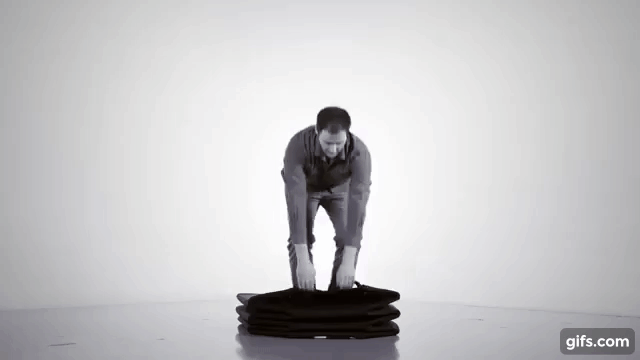Celebrating the Tenth Anniversary of Our Managing Editor Brian Tallerico at RogerEbert.com
In celebration of our Managing Editor Brian Tallerico's tenth anniversary at RogerEbert.com, we are highlighting fifty of his essential articles that he's published on this site over the past decade. The excerpts that follow are split into four categories: film reviews, interviews, TV reviews and essays. Click on each article title, and you will be directed to the full piece. I. FILM REVIEWS Mad Max: Fury Road From the very beginning, Miller and his team do something that so many other filmmakers fail to do—they define the geography of their action. Rather than merely tossing the camera around in the vain hopes of creating tension, they constantly give the viewer overhead shots and clear physical dimensions of what’s happening and where we’re going. And then they blow it all up. There are dozens of crashes, explosions, and flying bodies in “Fury Road,” and yet the piece never gets repetitive, especially as the emotional stakes increase with each sequence. Miller knows when to let the pace coast when it needs to, which is rarely, and then he pushes the pedal down and plasters you to your seat. Phoenix How do we process unimaginable betrayal? How do we overcome the kind of events that forever alter the trajectory of a life we so desperately want back? These are just two of the questions addressed by Christian Petzold’s masterful “Phoenix,” a film that firmly cements its director as one of the most impressive working today. With echoes of “Vertigo,” and a deeply confident visual language, Petzold’s film resonates long after its perfect ending. This is a riveting piece of work that never loses sight of its human story while also serving as a commentary for how an entire country deals with tragedies like war. A film this satisfying on every level—one that can be enjoyed purely for its narrative while also providing material for hours of discussion on its themes—is truly rare. James White “James White” is a masterful examination of how our behavior and the excuses we make about our lives fall away under certain, life-changing conditions. Most of us have dealt with grief, loss and pain in our lives, and it does something to you. It changes you. Hollywood has long told stories of losers made into winners through tragedy, but “James White” charts that trajectory in its own way, unafraid of the ugly truth of death. Mond shoots almost entirely in close-up, bringing us right into the face of James White, as unable to turn away from his story as he is. It wouldn’t work without the revelatory performance from Abbott, who commits to every emotional beat without making White too much of an asshole to make his redemption worthwhile. He's matched by fearless work from Nixon, doing the best work of her career. O.J.: Made in America Ezra Edelman’s stunningly ambitious, eight-hour documentary is a masterpiece, a refined piece of investigative journalism that places the subject it illuminates into the broader context of the end of the 20th century. You may think you know everything about The Trial of the Century, especially if you watched FX’s excellent “The People vs. OJ Simpson: American Crime Story,” but “OJ: Made in America” not only fills in details about the case but offers background and commentary that you’ve never heard before. It is an examination of race, domestic abuse, celebrity, civil rights, the LAPD, the legal process and murder over the last fifty years, using the OJ Simpson story as a way to refract society. Its length may seem daunting, but I would have watched it for another eight hours and will almost certainly watch it again before the summer is over. It’s that good. Moonlight While there’s memorable dialogue in “Moonlight,” it’s what’s unsaid that really resonates. It’s the look of a morally complex father figure when a child asks him why other kids call him a bad word. It’s a nervous glance between two young men who know something is a little different about their relationship but society has given them no words to express it. And it’s in the final scenes of the film—in which Jenkins knows he’s laid the groundwork, trusts his actors and allows the emotions of what’s unsaid to provide the dramatic thrust—that “Moonlight” makes its greatest impact. Jenkins deeply understands that it is human connection that forms us, that changes our trajectory and makes us who we are. The Florida Project Some of our greatest films achieve their greatness by presenting us with characters who feel completely fully-realized and three-dimensional. We feel like we know Chiron from “Moonlight” or Lee from “Manchester by the Sea.” Moonee, Hailey, and Bobby achieve the same kind of life beyond the film about them. It’s enough to make you want to slow down the next time you pass a place like the Magic Castle and look more closely at the lives unfolding there. It takes a very special movie to change the way we look at the people around us. “The Florida Project” is a very special movie. Jane “Jane” is that rare documentary t


In celebration of our Managing Editor Brian Tallerico's tenth anniversary at RogerEbert.com, we are highlighting fifty of his essential articles that he's published on this site over the past decade.
The excerpts that follow are split into four categories: film reviews, interviews, TV reviews and essays. Click on each article title, and you will be directed to the full piece.
I. FILM REVIEWS

From the very beginning, Miller and his team do something that so many other filmmakers fail to do—they define the geography of their action. Rather than merely tossing the camera around in the vain hopes of creating tension, they constantly give the viewer overhead shots and clear physical dimensions of what’s happening and where we’re going. And then they blow it all up. There are dozens of crashes, explosions, and flying bodies in “Fury Road,” and yet the piece never gets repetitive, especially as the emotional stakes increase with each sequence. Miller knows when to let the pace coast when it needs to, which is rarely, and then he pushes the pedal down and plasters you to your seat.

How do we process unimaginable betrayal? How do we overcome the kind of events that forever alter the trajectory of a life we so desperately want back? These are just two of the questions addressed by Christian Petzold’s masterful “Phoenix,” a film that firmly cements its director as one of the most impressive working today. With echoes of “Vertigo,” and a deeply confident visual language, Petzold’s film resonates long after its perfect ending. This is a riveting piece of work that never loses sight of its human story while also serving as a commentary for how an entire country deals with tragedies like war. A film this satisfying on every level—one that can be enjoyed purely for its narrative while also providing material for hours of discussion on its themes—is truly rare.

“James White” is a masterful examination of how our behavior and the excuses we make about our lives fall away under certain, life-changing conditions. Most of us have dealt with grief, loss and pain in our lives, and it does something to you. It changes you. Hollywood has long told stories of losers made into winners through tragedy, but “James White” charts that trajectory in its own way, unafraid of the ugly truth of death. Mond shoots almost entirely in close-up, bringing us right into the face of James White, as unable to turn away from his story as he is. It wouldn’t work without the revelatory performance from Abbott, who commits to every emotional beat without making White too much of an asshole to make his redemption worthwhile. He's matched by fearless work from Nixon, doing the best work of her career.

Ezra Edelman’s stunningly ambitious, eight-hour documentary is a masterpiece, a refined piece of investigative journalism that places the subject it illuminates into the broader context of the end of the 20th century. You may think you know everything about The Trial of the Century, especially if you watched FX’s excellent “The People vs. OJ Simpson: American Crime Story,” but “OJ: Made in America” not only fills in details about the case but offers background and commentary that you’ve never heard before. It is an examination of race, domestic abuse, celebrity, civil rights, the LAPD, the legal process and murder over the last fifty years, using the OJ Simpson story as a way to refract society. Its length may seem daunting, but I would have watched it for another eight hours and will almost certainly watch it again before the summer is over. It’s that good.

While there’s memorable dialogue in “Moonlight,” it’s what’s unsaid that really resonates. It’s the look of a morally complex father figure when a child asks him why other kids call him a bad word. It’s a nervous glance between two young men who know something is a little different about their relationship but society has given them no words to express it. And it’s in the final scenes of the film—in which Jenkins knows he’s laid the groundwork, trusts his actors and allows the emotions of what’s unsaid to provide the dramatic thrust—that “Moonlight” makes its greatest impact. Jenkins deeply understands that it is human connection that forms us, that changes our trajectory and makes us who we are.

Some of our greatest films achieve their greatness by presenting us with characters who feel completely fully-realized and three-dimensional. We feel like we know Chiron from “Moonlight” or Lee from “Manchester by the Sea.” Moonee, Hailey, and Bobby achieve the same kind of life beyond the film about them. It’s enough to make you want to slow down the next time you pass a place like the Magic Castle and look more closely at the lives unfolding there. It takes a very special movie to change the way we look at the people around us. “The Florida Project” is a very special movie.

“Jane” is that rare documentary that works in equal measure for those who know a great deal about Jane Goodall and those people who don’t know a thing. Most people probably think they know all they need to know about Jane Goodall. She watched chimps, right? Her research was essential to understanding not only the way we interact with the natural world but our place in it, but hers is not a name like Kurt Cobain that gets thrown around in conversations much in 2017. “Jane” fully elevates the scientific pedestal on which Jane Goodall should be placed but it does so in part by humanizing her, revealing the challenges she faced and discoveries she made as more than mere National Geographic footage you might see in a Science class.

Most heist movies are built on a sheen of cool genius, masterminded by a gang of antiheroes who are typically seeking a kind of justified vengeance. “Widows” is not like most heist movies. The emotional currents that power Steve McQueen’s brilliant genre exercise are different—it’s societal inequity, exhaustion at corruption, and outright anger at a bullshit system that steals from the poor to give to the rich. McQueen’s masterful film is the kind that works on multiple levels simultaneously—as pure pulp entertainment but also as a commentary on how often it feels like we have to take what we are owed or risk never getting it at all.

James and his team go into these racially charged areas like athletics and poetry, but then reveal how much the obvious racial politics on display there are also a part of everyday life. And yet you should know that “America to Me” is not a mournful cry for racial justice. It is often joyful. When I think of it, I think of the smiling faces of Charles, Kendale, Grant, Tiara, and the rest of the kids at OPRF. They’re just trying to get through the complex, challenging days of youth. They’re just trying to find their own definition of America. What can we, and I mean all of us, do to help them? It starts with listening to their stories.

I don’t often get as personal as some critics do in reviews, but how strongly I feel about this film seems to warrant one more closing thought. By virtue of being blessed to work here, I’m often asked what I think Roger Ebert would have thought about some of the films that have been released since he passed. It’s emotionally overwhelming to consider what he might have written about “Moonlight” or “Selma” and so I try not to go down that mental rabbit hole, but I felt that absence perhaps most greatly while watching “Roma.” When it ended, I thought more than ever about how he would have written about it. I think that’s because it so completely embodies what he considered the role of great cinema as an empathy machine. We should be thankful there are films like “Roma” keeping that machine humming.

The final half-hour of “Shoplifters” is some of the most emotional, powerful filmmaking of the year, and it’s thanks to how delicately Kore-eda has drawn these characters over the 90 preceding minutes. They feel as three-dimensional as any this year, thanks to Kore-eda’s humanist storytelling but also his expert direction of a truly amazing cast. Lily Franky is fantastic, but Ando Sakura is the stand-out—the way she conveys her character’s deep well of conflicted emotions in the final scenes is breathtaking. It’s one of the best performances of the year, a stand-out in an incredibly pure ensemble.

Just as the Western has often used real people and places as templates to tell fictional stories, Tarantino has crafted an elegiac ode to a time he’s only experienced through books and movies. Tarantino once said, “When people ask me if I went to film school I tell them, ‘no, I went to films.’” And it’s that education by projector light that weaves its way through every frame of “Once Upon a Time … in Hollywood,” a movie only he could have devised. And yet this is not the film that hardcore fans of “Pulp Fiction” and “Inglourious Basterds” may be expecting. It’s somber at times in the way it seems to be trying to grab something just out of reach—the promised potential of the people on the fringe of the city of angels, an attempt to capture a mythical time when movies, real life, and imagination could intertwine.

Bong has made several films about class (including "Snowpiercer" and "Okja"), but “Parasite” may be his most daring examination of the structural inequity that has come to define the world. It is a tonal juggling act that first feels like a satire—a comedy of manners that bounces a group of lovable con artists off a very wealthy family of awkward eccentrics. And then Bong takes a hard right turn that asks us what we’re watching and sends us hurtling to bloodshed. Can the poor really just step into the world of the rich? The second half of “Parasite” is one of the most daring things I’ve seen in years narratively. The film constantly threatens to come apart—to take one convoluted turn too many in ways that sink the project—but Bong holds it all together, and the result is breathtaking.

There have been numerous sci-fi films about people who had to go to the reaches of space to find truths within themselves but none quite like James Gray’s masterful “Ad Astra.” Thematically dense and visually sumptuous, “Ad Astra” may not work for those seeking an action/adventure thrill ride—it’s more “Solaris” than “Gravity” or “The Martian”—but it works wonders below the surface, serving as an examination of masculinity, a commentary on how we become our fathers, and can even be read as a search for an absent God. This is rare, nuanced storytelling, anchored by one of Brad Pitt’s career-best performances and remarkable technical elements on every level. It’s a special film.

Divorce is described in Noah Baumbach’s masterful “Marriage Story” as like a death without a body. Something has been lost. There is grieving, anger, denial. In his personal and moving story, Baumbach captures the insidious nature of divorce, how two well-meaning people who still care about each other will do things they would never think they would do. Surely, you’re not the kind of person who would use secrets as a weapon in a divorce case? You wouldn’t turn a child against a parent to gain an advantage? It’s other people who do stuff like that. With remarkable grace and compassion for his characters, Baumbach portrays divorce as a great equalizer, turning us into versions of ourselves we didn’t expect to become.

Filmmakers and artists in general have a tendency to judge their characters. Here’s the good guy, here’s the bad guy. Here’s the problem that needs to be solved for the leading man or lady to be happy by the end of the movie or damned because of their bad behavior. There’s a much lesser version of the true story of “Nomadland,” based on the book by Jessica Bruder, that does all of this, melodramatizing Fern’s story into one of redemption. Fern doesn’t think she needs to be redeemed or saved, and Zhao doesn’t push buttons in an attempt to make us feel sorry for her either, while also somehow never underestimating the loneliness and sadness of her situation. The result is a film that earns its emotions, which come from genuine, honest empathy more than anything else.

Lowery has adapted the 14th century chivalric romance Sir Gawain and the Green Knight into one of the most memorable films of the year, a fascinating swirl of masculinity, temptation, heroism, and religion. Arthurian experts may quibble with some of Lowery’s decisions and it is certainly a film that challenges traditional expectations of stories about heroic knights for modern audiences, but fans will be drawn to this mesmerizing journey guided by Lowery’s incredibly poetic eye, career-best work from Dev Patel, and an artistic sensibility that transports audiences to another world. It’s a film that embeds the concept of storytelling and performance into its narrative—whether it’s a King asking for a heroic tale or children watching a puppet show—while also weaving its own enchanting spell on audiences. More than any movie in a long time, I would have immediately watched it again, but it’s also a film that really strengthens in memory, swirling around your brain like the falling flakes of the opening scenes.

Some people might not be ready for HBO Max’s “Station Eleven.” After all, it’s a story of a pandemic that destroys most of the planet and divides its survivors. While it’s based on a 2014 acclaimed novel by Emily St. John Mandel, the show has something to say that feels unique in 2021, about what we think we’ve lost forever and what we discover will somehow return to us. It’s a show that resonates in a different way now than it would have pre-pandemic, but I think it would have been incredibly powerful whenever it came out because its themes are timeless. They just feel a little more urgent in 2021.

Nadeem and Saud reportedly looked to the sky as an escape from their upbringing in a working-class Muslim neighborhood, and they believe that feeding and caring for birds eats away their difficulties and earns them a form of religious credit. What happens if that’s gone? What happens when kids like them look up and don’t see the escape captured in the flight of the kite? What happens when the pigs and horses aren’t sharing space near the humans of New Delhi? What will we lose when we no longer value these things? “All That Breathes” isn’t just a gorgeously poetic display of the natural world but a reframing of why these things should matter not just to people as devoted as Nadeem and Saud but to all of us.

We are only at the very beginning of the wave of documentaries that will be released about life in the United States in the early 2020s. It will be defined by the human cost of the pandemic, but that historical event also shook loose several other issues, including economic disparity and racial inequality, among others. The most essential film yet made about this era is David Siev’s moving and triumphant “Bad Axe,” a film that has already won awards on the fest circuit and is now getting its limited theatrical release. I have thought about this movie more than any other this year. It’s not an understatement to say that it inspired me through some tough times in 2022 because it’s a portrait of family resilience against adversity. So many of the aforementioned non-fiction films to come about in 2020 and 2021 will suffer by trying to tell every story at once—“Bad Axe” tells only one story and yet somehow tells so many more.

“Can you find the wolves in this picture,” Ernest Burkhardt (Leonardo DiCaprio) reads aloud as he works his way through a children’s book early in Martin Scorsese’s “Killers of the Flower Moon.” The wolves aren’t really hidden at all, and they won’t be in the film that follows either, a masterful historical drama about evil operating in plain sight. One of the most disturbing things about Scorsese’s ambitious adaptation of David Grann’s non-fiction book of the same name is how little of its vile behavior stays in the shadows. This is the story of men who treated murder almost mundanely, issuing orders to have people killed like they would order a drink at the bar. Scorsese walks that fine line between telling a very specific story of a couple at the heart of a tragedy and commenting on the larger nature of evil. The wolves in "Killers of the Flower Moon" don’t hesitate to think that what they’re doing might be wrong as long as it profits them in the end.
II. INTERVIEWS

Oscar Isaac on "Inside Llewyn Davis"
As an experiment, I thought about how you communicate warmth and a connection without ever trying to charm or ingratiate. What happens is that when you interact with people that way—you tell a joke but you don't laugh to make it clear it's a joke—what happens is that the person either gets it and the relationship moves forward and intimacy grows OR they think you're an asshole. For some people, that's going to happen with this movie. "This movie is an asshole. I'm not interested." Other people will see a deeper connection happening and a deeper intimacy with someone who's in a difficult place. They'll be able to go with that. I actually don't think any of the actions that this guy takes could even be described as selfish.

Richard Linklater on "Boyhood"
I wanted to make a film about being a kid and I knew it would reflect on being a parent too. But you have to pick a point of view. I think there are a lot of movies about parents who have kids and it’s really about the parents and it kind of negates the kids’ point of view. I wanted to do it the other way, where it’s really kind of the kid’s view of his parents. People are like, “He’s kind of a ne’er-do-well dad.” No, he’s not. He’s working. You don’t know much. You don’t know what happens off-screen. And, as a kid, that’s kind of how it is. You don’t really know what your parents do all day when they’re not there. Your own limited scope of the world is projected on them. You might like them or deal with them but you really have no idea for the longest time. That’s what makes that last scene with Patricia when he’s leaving kind of poignant. There’s a disconnect. He can’t understand what she’s going through because he hasn’t lived enough years. He can FEEL for her but he can’t fully know. It doesn’t make sense. You have your own emotional and experiential set points.

I feel like our design sense—a lot of things that come with the way we use the medium—envelops kids. They love the use of color. The sense of design that we gravitate towards. First of all, I’m not sure if I was making a more adult film that I would choose these emotions and portray them the way we did. But subject matter-wise, we’re trying to impact each other. As we build the reels, we want John Lasseter to cry. At the same time, we know kids will see it and we have that concern, not so much that something would be inappropriate but maybe too complex. We had a screening maybe two years ago. We brought our own kids and friends and family—filled the theater with kids about 3 to 14. It was really cool because not only did they get it—we had a 5-year-old come back and tell us the entire story, name all the personality islands, explain how they work and the emotions and everything.

Jason Segel on "The End of the Tour"
I felt like when I read the script that the movie was an extension of the themes of “Infinite Jest.” It was echoing sentiments and ideas that David Foster Wallace was trying throughout his entire career to communicate, all the way up through “This is Water,” the famous commencement speech he gave—he was really passionately saying, “I’m in it with you guys. I’m not preaching at you. What my experience is that I have placed my value in some things—pleasurable entertainment—and found myself empty in some way. Does anybody else want to join me in this conversation?” That is what this movie is. And so I felt comfortable.

Terence Davies on "Sunset Song"
I was brought up on American music. My first film was “Singin' in the Rain” at seven. I fell in love with musicals, I love musicals. So, that was always theirs as part of one’s psyche. And they used to say on the contrary, Britain was a land without music, but that wasn’t true. That was not true. And it felt natural when there were certain things, especially when the camera moves, you think, “It needs something.” Or, I’d find the music and write a sequence to it, or write the sequence and think, “This has got to have music.” Because I’ve been listening to classical music and indeed popular music for 45 years, I just think, “Oh well, we’ll see if that will work.” And that’s the joy of it. Because when you find the right piece, that’s the joy.

The movie that we were making wasn’t about knowing but about allowing it to be what it was, to be honest. In my personal opinion, you miss out on the beauty of the moment if you go in planning what the moment is. It’s like having a vacation too jam-packed with activities. You miss all of the sunsets. You have to have some idea. And it became easy to understand textually what we needed because we were shooting in order. You could go, “we’ve gone kind of deep, and now we go in this direction and explore back here.” But, for the most part, every day had some of the unknown, and I think that’s how Lenny and I like to work—not going in “It has to be this way.” In the bedroom scene, I asked to not see the bedroom until we saw it, and then walk in and really feel it. The first reaction is sort of weirdly anticlimactic. It’s sort of taking it in but too big and too overwhelming and too much to process. It wasn’t sort of her on her knees, crying. The brain has such a hard time processing in the moment. You see a real process of reflection.

I do think the reporters are the heroes here. And we spent a lot of time with them and have a great amount of respect and affection for them. And we sat with a lot of survivors and heard their stories. It’s an important issue and it needs to be dealt with before more lives are ruined. We felt like, “Wouldn’t it be great if this movie works and actually has an impact and can get people talking?” Talking about abuse. Any kind of abuse. And, also, as you mentioned, what is the state of journalism? What happened here is great. We need more of that. We need reporters breaking down the door on gun control or on government spending or on political contributions. What’s the next great story that’s going to have an impact?

Charlie Kaufman on "Anomalisa"
When I’m writing a script, before I can write dialogue or anything, I have two or three hundred pages of notes, which takes me a year. So, it’s not like “what happens next.” I’ve got things that I’m thinking about but I don’t settle on them. And if I try to write dialogue before then, I can’t. It’s just garbage. There’s a point I can get to where I start writing character and then through the dialogue, after all of this preparation, the thing starts to feel like it’s a character developing through the dialogue. A lot of character traits do come from writing dialogue, but I have to be ready to do it.

If you try to create something that everybody can relate to, you’re gonna make something that nobody can relate to. I often say, this movie is made for an audience of two: myself and Tarell. It’s meant to be shared beyond us, clearly. But it’s meant to do right by an audience of two. I’m trying to get to the bottom of how the concept of manhood affects Chiron. And then how the people in his life are enacting this projection of manhood. That’s the box I have to work in. It’s great because the box is that small I can put my whole self into it. Once I’m working at that level, these things happen that I can’t control. These things have this beauty and this potency that they wouldn’t have if I was trying to engineer them.

Warren Beatty on "Rules Don't Apply"
I always think of something that Ronald Reagan said to me—he was a friend of mine. We, of course, disagreed on pretty much everything politically, and we would joke about it. He was a very fun person to be around, and I became friendly with him before he was Governor. Not close, but friendly. And he had invited me to bring “Reds” to the White House—a 3.5-hour movie with an intermission about a Communist who dies. At intermission, we went out, and I remember him saying, and he was not trying to be funny: ‘You know things are happening now. People are saying there’s no business but show business. And I don’t know how anyone could be President today without being an actor.” And he was not joking. I’ve been haunted by that lately.

Ethan Hawke on "The Before Trilogy"
Every year there’s people impaling themselves and doing great work that for some reason doesn’t find an audience. There’s a lot of great actors who didn’t even get to play Chet Baker in a movie. That was such a blessing, I don’t need a pat on the back, but you still … you do these films because you want people to see them, because it’s so much fun to talk to you about a movie that I made 20 years ago and have somebody care about it. It’s so rewarding because it says to you that it matters and that people do notice. Sometimes it’s like, “It doesn’t matter,” and you can get to that despondent place. And then there’s that other wave of energy, where it’s like, no, these cool people at the Criterion Collection are going to put out the movie and celebrate it, and you’re going to take time to write about it, and it’s like, “No, actually, it does matter. People do notice.”

David Lowery on "A Ghost Story"
The degree to which it’s personal is something that I’m still uncovering. I consistently surprise myself … I keep finding new ways in which it’s personal. This is the first time I’ve made a movie that’s even somewhat close to being autobiographical. Obviously, that’s a loose term in this case—this is a movie about a ghost in a bedsheet. Nonetheless, I’m pulling not from practical events in my life but emotional events. Everything in it is very deeply rooted in my own experience. Again, that’s not actual physical experience. I’ve not died. I’ve, luckily enough, not lost anyone in the way the characters in the movie lose somebody. But everything in there is deeply rooted in fears and questions and very prevalent … everything that’s in the movie is bubbling up straight from my own fear.

There are parts of me that want to be in my own film. There are parts of me that don’t want to be buried in an ensemble. There are parts of me that love ensemble. I think it’s not that I look for it it’s just that the projects that I’ve been fortunate to say yes to or be offered are projects that tend to have those parameters whether I set it up like that or not. If I’m gonna be honest, I’m not parsing through scripts—‘Not this one, this one.’ I’ve just been lucky enough that these jobs found me. Boots [Riley] was a call. Director Bong [Joon-ho for “Okja”] was a call. Director Lee was a call. I’ve got some luck in the universe and I’ll never take it for granted.

The American West—I’m drawn to that a lot because it was a time when you had to make your own choices. What I mean by that is that now when somebody injures you, people are always looking for somebody else to litigate their problems—an agent, a lawyer. Sometimes you just like to walk over and tell somebody what time it is and not feel like you’re going to be sued because they’re infringing on you or taking advantage of you. I think there’s something appealing in the West that you see people have to solve their own problems. And if you do that really well, you realize how hard and how dangerous that was. If you kill one, you’re going to have to kill them all. There’s a weird thing that happened out there, and I found it incredibly dramatic. The problem is they’ve always been kind of dumbed down. I think when you see a really good Western, it haunts you. You think that could have been me trying to protect my family, my wife.

İlker Çatak on The Teachers’ Lounge
Of course, my heart is with the teacher. That’s the hero of the film and everybody else is like an antagonist. At the same time, when I write characters that are antagonizing, I always try to understand them, and I always try to make them right too. I think it’s a little outdated to think of villains as “the evil people”. You need to have that sort of ambiguity. Audiences are much more educated and you can’t be flat and shallow when it comes to characterization because there is no such thing as a black and white world. I actually like films and stories when you can’t tell who’s right and who’s wrong. Whenever I have a story like that in my mind, I know that is something worth telling.
III. TV REVIEWS

FX’s “Fargo” Has Creative Spark of Coen Classic
FX’s "Fargo," debuting April 15, 2014, is clever, fun, twisted, and wildly entertaining in the way that fans of not just "Fargo" but all of the Coens’ work hoped it would be. With an amazing ensemble driven by great performances from top to bottom, an incredibly smart writers’ room, brilliant callbacks to the original that feel more inspired than forced, and a filmmaking style that feels as cinematic as this grand Minnesotan tragedy deserves, "Fargo" is one of the most addictive new shows of the year.

Hannibal is the Best Drama on Television
On every level, Bryan Fuller and the team behind “Hannibal” are elevating what we should expect from network television. Books could be written on how the show explores its themes not through traditional crime drama mysteries of the week but through character, and there’s simply no program, cable included, that uses visual language more confidently and engagingly. Not just ethics, but everything about the program, is reflected in its aesthetics. “Hannibal” has already investigated numerous themes over its two seasons and change, but it comes back to the thin line between someone insane enough to dine on human flesh and how close someone has to come to insanity to understand that. There’s no better program on television.

You Can Go Home Again: Netflix’s Wildly Entertaining “Stranger Things”
“Stranger Things” would be fun with all of these references to the movies that inspired so many of us in the ‘70s and ‘80s, but it wouldn’t be substantial. It has its own voice, characters and story to tell about that tenuous bond between family and tragedy, a common theme of an era in which horror often came to suburban places as idyllic as Elm Street. This series may seem like something you’ve seen before, but it doesn’t feel like anything else on TV now—it's much more grounded than something like “Hemlock Grove” and much smarter than “Scream.” They don’t often do horror on episodic television because it’s hard to maintain tension from episode to episode. It almost never works. This time it does.

Believe in the Power of HBO's "The Leftovers"
HBO’s breathtaking “The Leftovers” is one of the toughest shows to write about as a TV critic. It’s like trying to hold water. I can convey the basic idea, and try and explain why it’s so good, but there’s something that slips through. For one thing, it is a show that relies on the art of the unexpected. Creator Damon Lindelof himself wrote critics an email asking that they not even give away when this third season takes place, much less the details of what happens there. And people who have watched the first two years know that it is as unpredictable as television has ever been. That’s one of the things that’s so remarkable about it—few programs in the history of television have been this confidently defiant of the norms of the medium. Lindelof and his team play with time and space, moving back and forth not just in the present day and future but alternate planes of reality. It’s a show that’s designed to keep you confused, and so explaining what’s going on—even if that’s just my interpretation of it—ruins some of the joy of experiencing it.

Mesmerizing “The Handmaid’s Tale” Feels Startlingly Current
“The Handmaid’s Tale” is a masterful example of how a show achieves cumulative power through details. The show's concept, of course, overwhelms much of the first episode, but director Reed Morano (“Meadowland”), finds unique ways to reveal other details about this world gradually. Much of the writing about “The Handmaid’s Tale” has focused on the feminist message at its core and the parallels to challenges to women’s rights in 2017, but there are also fascinating undercurrents that Morano and the writers allow to merely enrich the background, such as how paranoia changes behavior, how believing in a vengeful God changes authority (you’re just doing his work), and how fear so often drives action. The third episode offers the best detail and arguably the most current commentary with the concept of how ingrained “women as property” can be not just in this vision of the future but today. Before the collapse, women were uniformly fired and their bank accounts closed. What’s the quickest way to dehumanize someone? Take away their ability to rightfully own anything. Then they can be owned.

Netflix’s Terrifying, Moving The Haunting of Hill House is Essential Viewing
That’s the greatest strength of “The Haunting of Hill House,” the way in which Flanagan and his writers organically bring horror into a relatable emotional dynamic with well-drawn characters we come to like. Ghost stories are inherently grounded in emotions we all feel; they came about as a way to deal with grief and explain the nightmares often associated with it. Flanagan and his team keenly understand how painful memories and deep wells of grief can lead to sleepless nights. The horror here never feels cheap, coming from its remarkable setting in the flashbacks and its characters’ emotions in the present day. Everyone has been overwhelmed by emotion in their lives; for the Crains, that feeling turns into the supernatural.

HBO’s Watchmen is Like Nothing Else on Television
“Watchmen” has so many themes woven through its narrative, but the first six episodes feel primarily to me to be about the national unease in a society that not only feels like it was forged through a violence that never really went away, it just changed faces, put on masks, or went underground. It’s not so much about heroes who keep the peace as it is a commentary on how people find comfort in an uncomfortable world. Of course, this will sound familiar to fans of “The Leftovers,” another show about moving through a world of shared trauma. The fifth episode of “Watchmen” is a masterful examination of fear in a post-9/11 world that opens at a boardwalk carnival and feels at times like a funhouse mirror of “The Leftovers.”

Paul Thomas Anderson, Thom Yorke Collaborate on Mesmerizing Anima
The music video as more than just a way to sell an upcoming album is an underrated art form. In the ‘80s and ‘90s, some incredible work was done in the form, launching careers of major filmmakers like David Fincher, Spike Jonze, and Michel Gondry. But since MTV turned into a reality TV channel, it’s not as easy to see music videos as it once was. Perhaps the next great American director is doing riveting work, but it’s buried under a thousand other things on YouTube. This is only one of several reasons that I was excited that Thom Yorke of Radiohead and Paul Thomas Anderson were collaborating for Netflix on what was billed as a “one-reeler,” but could also accurately be called a “short film” or “music video.” Whatever label you choose, it’s a reminder of the unique form of expression this art can be and feels like nothing else on Netflix. I’m thrilled at the prospect of other artists trying to follow suit and produce similar works. Maybe the music video isn’t dead after all. “Anima” is certainly very much alive.

HBO Confidently Adapts Breakthrough Video Game The Last of Us
These are minor complaints for a major event series, one that's likely to satisfy anyone interested in this kind of raw, post-apocalyptic storytelling. Video game adaptations often falter when they don't take their source material seriously on a narrative level. Instead, they try to replicate the "fun" of a video game on the big screen, and, more often than not, fall on their face. Druckmann and Mazin don't seek to replicate what it's like to play a video game; they seek to transport viewers to its world for nine episodes, allowing them to get lost in a story that's undeniably brutal and heartbreaking, but also offers hope for what comes next. In many ways, it's a perfect story for where we are in 2023, picking up the pieces of the last few years and finding what's important to us again.
IV. ESSAYS

Ebertfest Embodies Civilizing Power of Cinema
A festival as unique as Ebertfest forces viewers to draw connective thematic threads from film to film but it felt like it went beyond that this year as panels, Q&As, films and even conversations outside the theater reflected not just cinematic appreciation but human connection. The stories told at "Remembering Roger Ebert" of a man who was as generous as he was brilliant carried those who heard them through the films that day. Ebertfest is a reminder that films don’t exist in a vacuum. It’s impossible to watch Bennett Miller’s "Capote" in the way we did before Philip Seymour Hoffman’s passing. Steve James’ film wouldn’t resonate the same if Roger Ebert hadn’t passed away before its completion. Even films like "A Simple Life" and "Museum Hours" strike a different note than they would anywhere else on any other date. Watching them in the context of Ebertfest is something that can never be replicated.

The Lion of Cinema: An Appreciation of “Herzog: The Collection”
Watching sixteen Werner Herzog films in a short period of time, one can easily see their connections and the filmmaking patterns of their creator. He rarely includes images of overt sexuality or even violence, although the constant threat of the latter in our society permeates a number of his narratives. He even more rarely underlines an emotional moment or uses manipulative filmmaking techniques. He says on the commentary for “Nosferatu: The Vampyre,” “I don’t want to see an actor cry, I want to see the audience cry,” to explain why he would take a scene most directors would shoot in close-up—that of Jonathan Harker saying goodbye to Lucy—and shoot it from behind and from a distance. From the kind of basic filmmaking habits one notices while watching a career progress on Blu-ray—Herzog often opens his films with a mood-establishing shot about the power of nature (from the storms of “Where the Green Ants Dream” to the foggy hills of “Aguirre, the Wrath of God” to the unforgettable prologue of “Heart of Glass”)—to the more complex themes that keep popping up in Herzog’s work to his tumultuous relationship with Klaus Kinski, this is the kind of Blu-ray experience that truly allows for a greater appreciation of one of our greatest filmmakers.

I Am Not a Gun: The Timelessness of “The Iron Giant”
The message of peace and sacrifice feels more urgent today than it did even in 1999. In the world of “The Iron Giant,” violence propagates violence, and it’s violence from the establishment—the military—and lies about the need to use such violence, that starts the climax of the film. Even before that, Bird layers his story with so many subtle, detailed lessons that kids ingest on a subconscious level. Watching it again on Blu-ray—looking better than it ever has—I was struck by my son’s reaction to the scene in which the Giant rushes to put a train track back together again. Unlike in SO many family films, in which he’d barely do so in time and retreat to safety, he doesn’t succeed. He gets hit by the train. First, we get the lesson that it’s OK to fail—Hollywood films so often miss that one, giving kids images of infallible heroes. More importantly, he gets up and puts himself back together after the train hits him. We can overcome damage. We are resilient. And it is how we respond that matters.

A Short Film About Everything: On Krzysztof Kieslowski’s “Dekalog”
It’s tough to capture the impact of “Dekalog” in words because modern viewers have become so accustomed to high-concept, gimmicky television; a ten-episode series based on the ten commandments sounds like something Ryan Murphy would try in 2017. And yet “Dekalog” transcends its structure. First, it’s not so much about each specific commandment—in fact, some episodes are about multiple ones and it’s never explicitly stated which one is which. The examination of “Thou shalt not kill” in episode five is harrowing and direct, calling into question the death penalty as a violation of that commandment as much as murder, but episode three integrates “Thou shall not commit adultery” with “Remember the Sabbath day.” Instead of offering direct examinations of the commandments, "Dekalog" is an exploration of how they exist in an increasingly complex world.

Grace and Nature: On Criterion’s Release of The Tree of Life
“The Tree of Life” is a visual masterpiece, (shot by Emmanuel Lubezki, who would win three Oscars for Cinematography after this but bafflingly lose this one to "Hugo") and has never looked better than it does on this Blu-ray. Much has been written about how Malick seeks to find that “magic moment” when he’s making a film, only really knowing if he got it when he’s editing. He got so many of those moments here, from the butterfly that lands on Jessica Chastain’s wrist to the light streaming through a stained glass cinema to the framing of a father touching his new son’s foot for the first time—the film is so full of remarkable imagery that it’s emotionally overwhelming at times. I’ve long been a proponent of films that only work as films—not merely faithful adaptations of books or filmed plays, for example—and “The Tree of Life” understands visual language as well as any movie of the last decade. And it uses those striking images to ask the truly big questions. How do we grieve? How do we remember? How do we live? And what role does God play in all of this?
To find all of Brian Tallerico's work published at RogerEbert.com, click here.



















